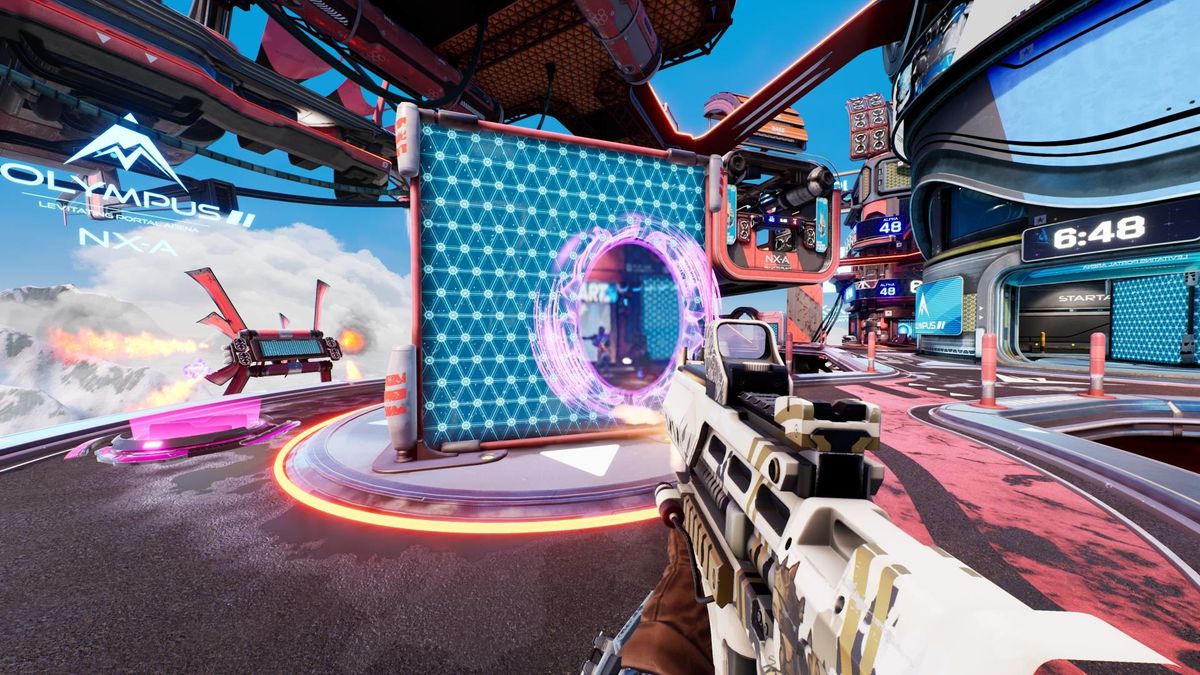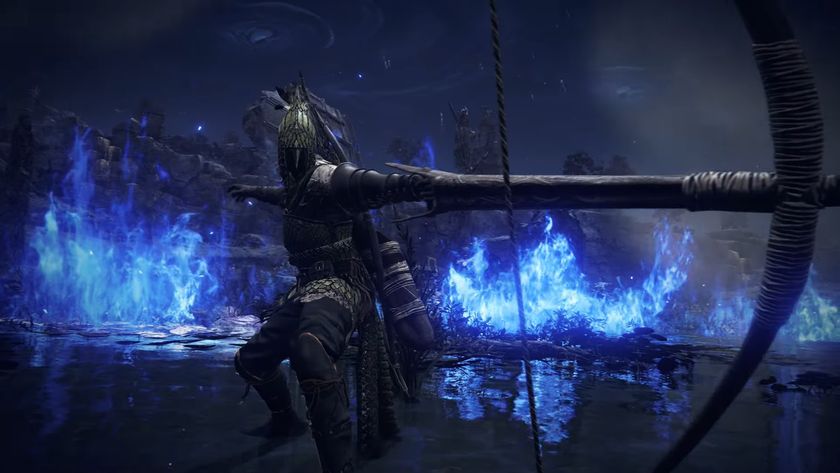
Splitgate has become too popular for its own good. The first-person shooter entered a new phase of its open beta in July, garnering enough attention that its developer, 1047 Games, was forced to delay the launch of the full game. The team is now working to solve a "myriad of technical problems" resulting from increased stress on the Splitgate servers. It's been a week since that decision by 1047 Games was made but the pressure hasn't eased up. In fact, some players are now queuing for 90 minutes just to give the Splitgate beta a try for themselves.
So, what is it about Splitgate that's convincing people to wait for over an hour just to play it? Having spent a couple of hours with the game on Xbox Series X – Splitgate crossplay is supported across PC, PlayStation, and Xbox consoles – it's easy to understand the appeal. Splitgate could generously be described as the action of Halo 2 meeting the mechanical brilliance of Portal. It's a fast-paced arena shooter with multi-dimensional combat, one that evokes the feel of FPS multiplayer from the aughts.
Eight players run around dressed in costumes that are eerily reminiscent of the Mark VI MJOLNIR Powered Assault Armor, were it designed in a Fortnite funhouse rather than on the production lines of the UNSC. You can open yellow and blue portals against walls at will, letting teams duck and weave around one another with relative ease. Combat clicks when you play aggressively, the jump is floaty and manageable, and the weapons pack a serious punch if you can tease the reticle to hang over a head. Hell, Splitgate's Stadium map may as well be a reskin of Halo 2's Midship.

"Splitgate has this dated charm to it, one that is all too easy to fall in love with if you played multiplayer games in the early Xbox 360 era"
What I'm trying to say is that Splitgate has this dated charm to it, one that is all too easy to fall in love with if you played multiplayer games in the Xbox and early Xbox 360 era. There's been a steady uptick in arena shooters in recent years, enough so that I don't think 1047 Games dutifully evoking the spirit of Halo would be enough to set it apart from the free-to-play pack. Thankfully, Splitgate uses arena combat as a foundation, building upon it with a really smart use of portals – which completely changes the way you think about engagement, positioning, and traversal.
You could place a portal against a distant platform and use it to zip across the map in a heartbeat, giving you a new vantage point over the environment with a sniper rifle in hand. Perhaps you'll spot enemies grouped together in a corridor and decide to throw a portal in behind them, fire through the new dimensional rift until they turn to pursue you, and then close the pathway just as quickly as you opened it to stop your aggressors from retaliating. There's such a wide variety of offensive and defensive capabilities with the use of portals, one that makes Splitgate standout among the competition.
What's behind Splitgate's spike in popularity?






The popularity of Splitgate has increased quickly in recent weeks. According to SteamDB (which only tracks people playing through Steam, and doesn't factor in players on PlayStation and Xbox) the Splitgate open beta has steadily risen from a peak of 400 concurrent players in early July to hitting an all-time peak of over 59,000 this past weekend, helping Splitgate assert its place in the top 20 most popular games on the platform. 1047 Games says that Splitgate hosted no fewer than 100,000 concurrent players across all platforms and it shows no signs of slowing down. Maybe it's coincidence that the Splitgate surge occurred while Halo Infinite was having a closed beta of its own, or perhaps it indicates that there's a community out there eager to play a Halo-style game without all modern accoutrements of Xbox Game Studios' flagship shooter.
Whatever the reason, it's this recent surge in popularity that caused the 90-minute wait time to play. It's something 1047 Games CEO Ian Proulx recently said the small studio of 30 is trying to address. "Our team has been blown away by the incredible reception the Splitgate community has shown us. With the steep and sudden increase in players trying to access servers, we're having to sort out a myriad of technical issues that come with this level of insane growth. We've worked hard to provide a high-quality game and experience, and our biggest challenge is simply to have enough capacity to serve the entire community."
Sign up to the 12DOVE Newsletter
Weekly digests, tales from the communities you love, and more
Splitgate was supposed to launch on July 27 for PC, PS4, PS5, Xbox One, and Xbox Series X as a free-to-play experience, before a tidal wave of interested players crashed those dreams. The game is now set to launch later in August and it's well worth checking out – it hits that sweet spot between familiarity and freshness that so few games are able to conjure these days, particularly in a market that's saturated with shooters. Should you queue for 90 minutes to try it? That's something that only you can decide, but I'd certainly recommend that you don't let this one pass you by without at least trying it.
While you're waiting for the Splitgate servers to come back online, why not try one of the best FPS games.

Josh West is the Editor-in-Chief of 12DOVE. He has over 15 years experience in online and print journalism, and holds a BA (Hons) in Journalism and Feature Writing. Prior to starting his current position, Josh has served as GR+'s Features Editor and Deputy Editor of games™ magazine, and has freelanced for numerous publications including 3D Artist, Edge magazine, iCreate, Metal Hammer, Play, Retro Gamer, and SFX. Additionally, he has appeared on the BBC and ITV to provide expert comment, written for Scholastic books, edited a book for Hachette, and worked as the Assistant Producer of the Future Games Show. In his spare time, Josh likes to play bass guitar and video games. Years ago, he was in a few movies and TV shows that you've definitely seen but will never be able to spot him in.

After 24 years, one of Capcom's greatest fighting games finally gets a definitive English patch featuring the 5,100 win quotes the devs never bothered to translate

New Elden Ring Nightreign trailer is all about the archer class that wasn't in the beta, and this might be the first FromSoftware game where bows don't suck










